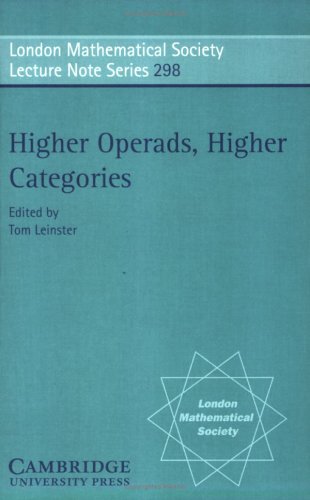
Higher Operads, Higher Categories
by Tom Leinster
Publisher: arXiv 2003
ISBN/ASIN: 0521532159
ISBN-13: 9780521532150
Number of pages: 410
Description:
Higher-dimensional category theory is the study of n-categories, operads, braided monoidal categories, and other such exotic structures. It draws its inspiration from areas as diverse as topology, quantum algebra, mathematical physics, logic, and theoretical computer science. This is the first book on the subject and lays its foundations.
Download or read it online for free here:
Download link
(3MB, PDF)
Similar books
 Category Theory for the Sciences
Category Theory for the Sciencesby David I. Spivak - The MIT Press
This book shows that category theory can be useful outside of mathematics as a flexible modeling language throughout the sciences. Written in an engaging and straightforward style, the book is rigorous but accessible to non-mathematicians.
(8107 views)
 Seven Sketches in Compositionality: An Invitation to Applied Category Theory
Seven Sketches in Compositionality: An Invitation to Applied Category Theoryby Brendan Fong, David I Spivak - arXiv.org
This book is an invitation to discover advanced topics in category theory through concrete, real-world examples. The tour takes place over seven sketches, such as databases, electric circuits, etc, with the exploration of a categorical structure.
(6928 views)
 Category Theory
Category Theory- Wikibooks
This book is an introduction to category theory, written for those who have some understanding of one or more branches of abstract mathematics, such as group theory, analysis or topology. It contains examples drawn from various branches of math.
(12548 views)
 Category Theory Lecture Notes
Category Theory Lecture Notesby Daniele Turi - University of Edinburgh
These notes were written for a course in category theory. The course was designed to be self-contained, drawing most of the examples from category theory itself. It was intended for post-graduate students in theoretical computer science.
(12307 views)